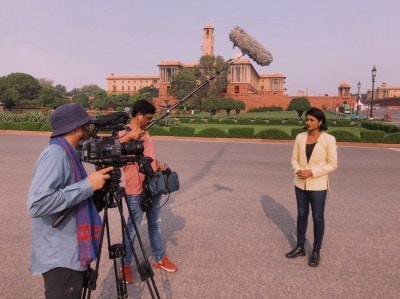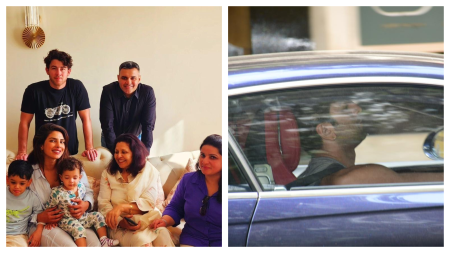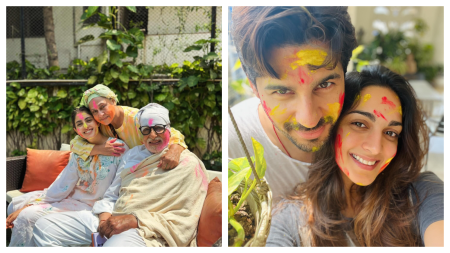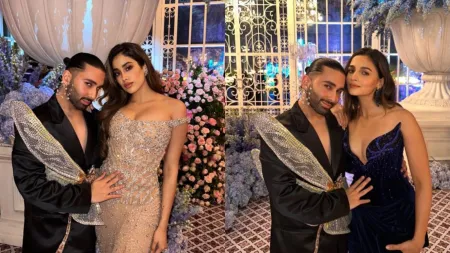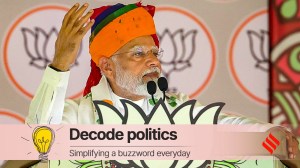- India
- International
‘Kashmir is the Hamlet of my film,’ says Vishal Bhardwaj on Haider
"Haider is an extension of what I have attempted in Maqbool and Omkara," says Bhardwaj.
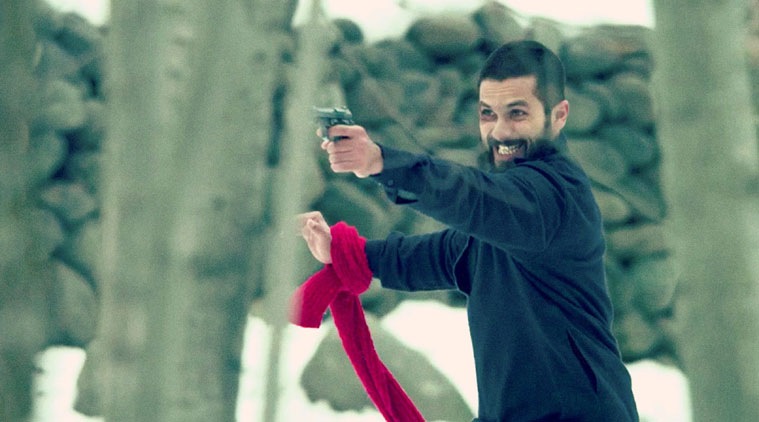 Haider is an extension of what I have attempted in Maqbool and Omkara.
Haider is an extension of what I have attempted in Maqbool and Omkara.
Vishal Bhardwaj on Haider, how he nearly reimagined Hamlet as an espionage thriller, composing songs at airports and learning how to tell a story without words.
Haider is your third adaption of a Shakespearean tragedy, after Maqbool and Omkara. Where does Shakespeare end and Vishal Bhardwaj take over?
I don’t really know how to answer this. Haider is an extension of what I have attempted in Maqbool and Omkara. Haider doesn’t begin like he (Shakespeare) begins his play. I’ve turned his third act into the first act. As a filmmaker, I wanted to make Hamlet in Kashmir. In my film, in a way, Kashmir becomes Hamlet.
What was it about Kashmir that made you set your Hamlet there?
It was the political turmoil and the 25 years of tragedy of Kashmir that compelled me. Our way of looking at Kashmir has either been cosmetic — only for shooting songs — or rhetoric, where we show a man in a phiran, holding a Kalashnikov. Haider is the first film where we see Kashmir from the inside. I don’t think we have made a mainstream film about the issue. If this was Europe, we would have made 200 films on Kashmir. Hollywood is still making films on the Nazi era. Every year, there is a film on World War I. Now, they are telling stories of Iraq, even television has Homeland. They have a take on “human conflicts” lekin hum log toh chori se baaz nahin aaye hain (but we have still not gotten over the theme of theft). Hum abhi bhi thieves ki filmein bana rahe hain (We are still making films about thieves). The human conflict in Kashmir drew me. I’ve set Haider in 1995, when militancy was at its peak. I wanted to observe the human tragedy that a regular middle-class family went through. What happened to the families that didn’t move away? What happened to the mother who was a teacher, the father who was a doctor, the uncle who was a lawyer? Till now, we have heard points of view from this side or that side. We know the two extremes but the tension is always in the middle — what about the people hanging between the two extremes of the rope?

How did the collaboration with journalist-author Basharat Peer, who co-wrote Haider, work out?
My wife, Rekha, was reading Basharat’s memoir, Curfewed Night. One night, I saw her crying while reading it. She said, “Hila diya mujhe iss book ne (This book shook me).” I had just returned from the US and was severely jetlagged, so I didn’t read the book. But Hamlet was very much on my mind. In fact, I was developing the play as a contemporary espionage thriller with author Stephen Alter. We wrote a 30-page synopsis, which I sent to Gulzarsaab to read. He liked it, but asked me, “Where is the tragedy of Hamlet in this thriller?” He was right. What more could I tell about a RAW (Research and Analysis Wing) agent? How much do we really know about the real life of an agent? The Official Secrets Act is so stringent that it’s tough to tell an authentic account of a RAW agent. I was heartbroken, but Hamlet was still on my mind. That’s when I remembered Basharat’s book. I contacted him and we started work. The authentic feel in Haider is because of him. There are so many little things in the film which only an insider could bring in. If Basharat was not a part of the film, it wouldn’t be made or it wouldn’t be made this way.
You worked with Tabu after a decade since Maqbool. Is it easy for a director and actor to pick up the chemistry from where they left it?
There is always chemistry between people. The actor-director equation comes in later. If the friendship remains, then you can take it from where you left. Tabu se mere jhagde bhi bahut huye… saalon baat bhi nahin hui… par phir ek din baat shuru ho gayi. Hamari dosti aisi hai. (Tabu and I had a lot of fights… we didn’t speak to each other for years… but then one day we started talking again. Our friendship is such). With some people you just work professionally, like Saif (Ali Khan) — I did Omkara with him and that’s about it. With Tabu and Irrfan, it’s friendship.
But do you ever miss working with a particular actor? Like Gulzarsaab once told me that he missed working with Sanjeev Kumar.
I miss Priyanka Chopra, both as an actor and as a person. When we work together, it feels as if main apne school ke bachpan ke kissi dost ke saath kaam kar raha hoon (I am working with one of my childhood friends from school). I also miss Irrfan, whose sense of cinema is at another level. Sometimes, an actor takes a performance to another level, and as a director you miss him the most.
Which actor surprised you the most?
Pankajji (Kapur). He took Abbaji’s role in Maqbool to another level. The small gestures he added to his performance, the little things he did, the way he got Abbaji’s walk, he stunned me. Pankajji is the kind of actor who takes from your work, adds his own brilliance to it and shows how great your work is.
How do you strike a balance between writing, directing, producing, composing and singing? What do you enjoy the most?
I’m always shifting gears in my head. I’m thinking about something or the other all the time. I enjoy my music the most. It gives me peace and is my greatest love.
Do you start composing while writing a film or after you have written it?
It begins during the writing. In Omkara, all the songs were composed while writing the script. There is no regimented process of how I make music. Mere saare gaane yunhi chalte phirte bante hain (All my songs are composed just like that). Sometimes, they are made because I want to use them cinematically at a crucial moment in a film, like the lullaby Jag jaa ri gudiya in Omkara, which Omkara sings to wake his wife up. I knew that he would sing it again during the climax, so I needed to compose a lullaby. In Haider, I needed the grave-diggers song, so I made Aao naa. I wrote some lines, but Gulzarsaab only retained Aao naa and changed the rest. You’ll be surprised to know that Gulzarsaab and I have never composed a song, sitting at a place. All our songs have been written and composed at airports or in cars. Most of the times, he is standing in a queue saying the lines, while I sing it back to him on the phone. I will never forget how we made Ibn-e-batuta for Ishqiya. We were standing in a long queue waiting to board a flight. By the time we got to the bus, we had the mukhada ready. Inside the plane, we made the antara, and by the time we landed, we had the entire song.
Which song has been the toughest to compose for you?
That would be Haider’s Bismil. It took over four months to compose. I recorded it in Srinagar, Mumbai and London, but I couldn’t get what I wanted. This is ‘The Mousetrap’ (the play within the play) of Hamlet. This is when Haider re-enacts the murder, but I had to do that while retaining the poetic flavour. It was tough.
How do you sustain your creativity?
By taking as many trips to Landour (near Mussoorie) as I can. Once I’m in Landour, I don’t do anything. I just walk and meet Ruskin (Bond). I want to shift there permanently. Now, there is no compulsion to work from Mumbai because all you need is a computer to work from anywhere.
How do you view your growth as a filmmaker?
I’ve learnt how to convey without words. Earlier, my films were too verbose. In Haider, I have used a lot of silence. I even keep my background music minimalistic.
Is there a filmmaking rule you have had to unlearn?
In filmmaking, less is more. The more you try to explain, the more you mess it up.
If you were to throw a dinner party and invite five of your favourite characters, who all would you call?
Maqbool’s Abbaji, 7 Khoon Maaf’s Susanna, Kaminey’s Guddu, the witch from Makdee and Omkara. I can already see Abbaji and Omkara coordinating and planning something. I can see the witch and Susanna sizing each other up.
Do you follow the work of your contemporaries? Do you have any favourites?
I don’t keep a track of anyone as such, but some of the recent films that I loved are Ship of Theseus, Dibakar Banerjee’s short film Star in Bombay Talkies and The Lunchbox. I also really liked Dibakar’s Oye Lucky! Lucky Oye! as well as Anurag Kashyap’s Black Friday and Dev.D. Anurag really surprised me with Dev.D. When he first told me he wanted to do a modern adaptation of Devdas, I tried to talk him out of it.
To me, Devdas’s is a boring story. What does this guy do the entire day? Just drink and cry? That’s boring.
What would your Devdas be like?
My character would become a gangster in love and not sulk in booze.
You have so many scripts ready. Some of those were announced, too, but never took off. Do you have any plans to revisit them?
Jo filmein bante bante reh jaati hain (The films that never get made), they are your unhealed wounds. They don’t bother you when you are occupied with other things, but when you are alone, they pinch you. Out of all my earlier scripts, I would love to make Barf and Dream Sequence.
Click for more updates and latest Bollywood news along with Entertainment updates. Also get latest news and top headlines from India and around the world at The Indian Express.
Photos
Must Read
Apr 23: Latest News
- 01
- 02
- 03
- 04
- 05











